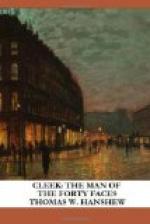“I knew that George Carboys had returned to that studio by the dry marks of muddy footprints, that were nothing like the shape of Van Nant’s, which I found on the boards of the verandah and on the carpet under one of the windows; I knew, too, that it was Van Nant who had sent that pigeon. You remember when I excused myself and went back on the pretext of having forgotten my magnifying glass the other day? I did so for the purpose of looking at that fifth pigeon. I had observed something on its breast feathers which I thought, at first glance, was dry mud, as though it had fallen or brushed against something muddy in its flight. As we descended the stairs I observed that there was a similar mark on Van Nant’s sleeve. I brushed against him and scraped off a fleck with my finger-nails. It was the dust of dried modelling clay. That on the pigeon’s breast proved to be the same substance. I knew then that the hands of the person who liberated that pigeon were the hands of someone who was engaged in modelling something or handling the clay of the modeller, and—the inference was clear.
“As for the rest; when Van Nant entered that studio to-night, frightened half out of his wits at the knowledge that he would have to deal with the one detective he feared, I knew that if he approached that statue and made any attempts to examine it I should have my man, and that the hiding-place of his victim’s body would be proved beyond question. When he did go to it, and did examine it—Clarges Street at last, thank fortune; for I am tired and sleepy. Stop here, Lennard; I’m getting out. Come along, Dollops. Good-night, Mr. Narkom! ‘And so, to bed,’ as good old Pepys says.”
And passed on, up the street, with his hand on the boy’s shoulder and the stillness and the darkness enfolding them.
CHAPTER XXVII
For the next five or six weeks life ran on merrily enough for Cleek; so merrily, in fact, that Dollops came to be quite accustomed to hear him whistling about the house and to see him go up the stairs two steps at a time whenever he had occasion to mount them for any purpose whatsoever.
It would not have needed any abnormally acute mind, any process of subtle reasoning, to get at the secret of all this exuberance, this perennial flow of high spirits; indeed, one had only to watch the letter box at Number 204, Clarges Street, to get at the bottom of it instantly; for twice a week the postman dropped into it a letter addressed in an undoubtedly feminine “hand” to Captain Horatio Burbage, and invariably postmarked “Lynhaven, Devon.”
Dollops had made that discovery long ago and had put his conclusions regarding it into the mournfully-uttered sentence: “A skirt’s got him!” But, after one violent pang of fierce and rending jealousy, was grateful to that “skirt” for bringing happiness to the man he loved above all other things upon earth and whose welfare was the dearest of his heart’s desires. Indeed, he grew, in time, to watch as eagerly for the coming of those letters as did his master himself; and he could have shouted with delight whenever he heard the postman’s knock, and saw one of the regulation blue-grey envelopes drop through the slit into the wire cage on the door.




